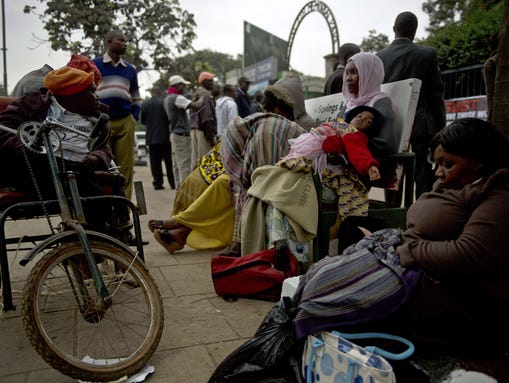Luke Skywalker
Super Moderator
{vb:raw ozzmodz_postquote}:
President Barack Obama reflects as he participates in a wreath laying ceremony, Saturday, in Nairobi, at Memorial Park in honor of the victims of the deadly 1998 bombing at the U.S. Embassy. Obama's visit to Kenya is focused on trade and economic issues, as well as security and counterterrorism cooperation.(Photo: Evan Vucci, AP)
NAIROBI<span style="color: Red;">*</span>— Cheering crowds at the memorial for victims of the 1998 Kenyan embassy bombing<span style="color: Red;">*</span>welcomed President Obama on Saturday as police and the president’s security detail pushed back onlookers trying to catch a glimpse of him.
Thousands of residents lined the streets as they waved Kenyan flags, chanted Obama’s name and sang traditional songs.<span style="color: Red;">*</span>But victims of the August 1998 U.S. embassy bombing who say they have not been compensated for the attack<span style="color: Red;">*</span>were not satisfied.
“Obama has finally made us feel neglected after he left the site without assuring us if we will be compensated,"<span style="color: Red;">*</span>said Jane Adhiambo Ayugo, 46, a survivor of the attack. “There is no need of visiting the memorial site and honoring the departed souls if you can’t pay those who survived.”
USA TODAY
Obama calls for African nations to treat gays equally
At Memorial Park<span style="color: Red;">*</span>—<span style="color: Red;">*</span>where the names of the victims in<span style="color: Red;">*</span>the attack are carved into a brick wall in an open courtyard<span style="color: Red;">*</span>—<span style="color: Red;">*</span>Obama laid a wreath of white lilies with blue and red ribbon before stepping back and studying the names on the wall.<span style="color: Red;">*</span>He was joined by his<span style="color: Red;">*</span>national security adviser, Susan Rice, who was the top U.S. diplomat to Africa at the time of the bombing.
Al-Qaeda's deadly attack here killed 213 people, including 12 Americans. The bombing injured more than 4,000 people in one of the darkest moments in Kenya's history. A simultaneous bombing at the U.S. embassy in Tanzania killed 11 and injured around 100 people.
Victims demanded the president address their plight.<span style="color: Red;">*</span>“We expect the president to address the issue of compensation before he leaves the country tomorrow,” said Charles Ojwang, 52, a widower. “We will go on with our protests to ensure Obama listens to our needs.”
Another survivor said he had given up in his push for compensation after Obama left the site without offering a solution despite seeing the demonstrators.<span style="color: Red;">*</span>“I have today surrendered pushing for this compensation. President Obama’s visit was my last option,” said Sofia Abdalla, a widow, who<span style="color: Red;">*</span>walked more than 50 miles to the site. “If Obama can’t address this issue, then nobody can.”
The U.S. says<span style="color: Red;">*</span>it spent tens of millions of dollars to help victims and their families, according to the Associated Press.<span style="color: Red;">*</span>In 2014,<span style="color: Red;">*</span>U.S. courts awarded compensation to Tanzanian, American and Kenyan victims but<span style="color: Red;">*</span>Elizabeth Maloba, 45, who<span style="color: Red;">*</span>lost her husband,<span style="color: Red;">*</span>said she and other victims have not seen<span style="color: Red;">*</span>any of that money.
"We feel neglected and cheated by the U.S.," said Maloba, who then repeated an African proverb about hypocrisy. "They preach water but drink wine."
Kenya is a key regional ally for Washington in the fight against the al-Qaeda-linked terror group al-Shabab, based in neighboring Somalia. When U.S. Secretary of State John Kerry visited Nairobi in May, he pledged $100 million for Kenya in the fight against terror.
President Obama's visit comes just three months after al-Shabab gunmen massacred 148 people, mostly students, in a raid on a northeastern Kenyan university. A four-day siege in 2013 by the militants at the upscale Westgate Mall in Nairobi<span style="color: Red;">*</span>left 67 dead.
Some of the victims and survivors of the embassy attack have been rendered jobless and disabled to the extent that they can't fend for themselves. Others lost their loved ones and breadwinners. Dozens staged a hunger strike in the days leading up to Obama's visit, including Maloba, who<span style="color: Red;">*</span>said she<span style="color: Red;">*</span>blames the U.S. and Kenyan governments for refusing to pay attention to the victim's plight for the past 17 years.
"The U.S. government promised that all victims of the blast will receive compensation, but until now it has been an empty promise," she said. "We need President Obama to address this issue once (and) for all and pay us our money."
Paul Lima, a survivor of the blast, also says he has seen none of the money.<span style="color: Red;">*</span>The attack disabled him, and he cannot fend for himself.<span style="color: Red;">*</span>"I need to be compensated because I have suffered for a long time. I cannot work because of the attack," Lima said. "My children are not going to school because I can't pay their fees. We stood with America<span style="color: Red;">*</span>during the attack and they should also do the same."
Survivors and kin of victims of the 1998 al-Qaeda bombing of the U.S. embassy in Kenya are pictured at the memorial of the blast following an overnight vigil.<span style="color: Red;">*</span>(Photo: Tony Karumba, AFP/Getty Images)
Eliud Mulama, director of the Victims of Terrorism Organization, a nongovernmental group, said the U.S. government used Kenyan victims to convict the perpetrators of the embassy attack only to neglect them later. He also criticized the Kenyan government for failing to push the U.S. government to pay the victims on time.
"Some of the victims have already died while waiting for the compensation," he said. "We urge both governments to speed up the process so that the remaining can get their compensation."
"We expect the U.S. government to do the right thing and ensure victims get compensation," he added. "We need President Obama to solve this issue."
Powered By WizardRSS.com | Full Text RSS Feed
